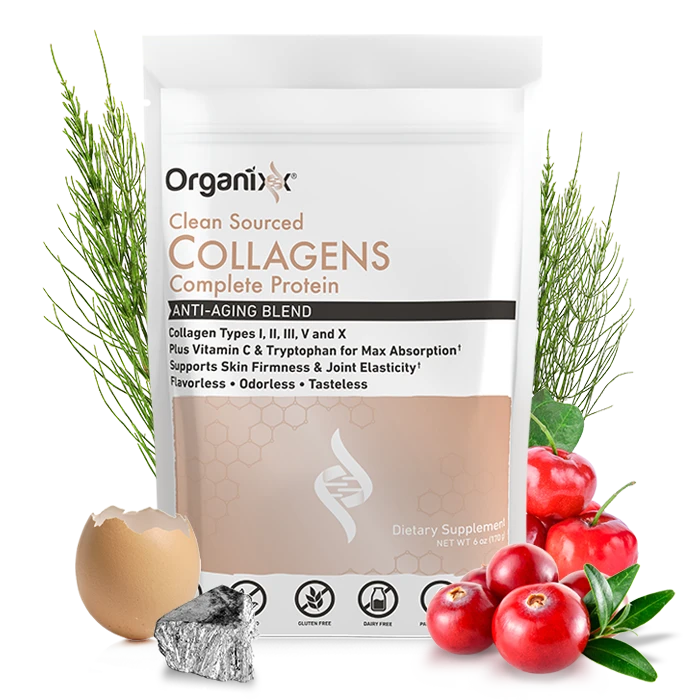Empowering you Organically – Season 10 – Episode 86
Title: Collagen for Weightloss? Here’s What the Science Says
Hosts: Jonathan Hunsaker, TeriAnn Trevenen
Description: You may have heard about collagen’s ability to help with skin firmness, joint and gut health, and stronger hair, nails, and teeth… but what about collagen for weight loss? Is that among its many purported benefits? Indeed, studies have shown a link between collagen supplementation and weight loss – and the mechanisms for this connection may surprise you.
***
FEATURED PRODUCT
Powerful Proteins Help Smooth Wrinkles, Keep Skin Plump, and Promote Joint Health
- FOUR COLLAGEN SOURCES: We’ve combined collagen types I, II, III, V and X – the major types of collagen your body needs – from four different sources (grass-fed cows, wild-caught fish, antibiotic-free chicken, eggshell membrane) for the ultimate matrix of health benefits.
- HIGHLY BIOAVAILABLE: Clean Sourced Collagen is formulated with VItamin C, Horsetail Extract and Zinc for maximum absorption.
- EASY TO TAKE: Our revolutionary, odorless, tasteless, and easy-to-mix Clean Sourced Collagens can be added to a wide variety of healthy foods or mixed into water, juice, or your favorite smoothie.
- NATURAL INGREDIENTS: We only use the purest ingredients found on Earth and our supplements are free from artificial flavors, preservatives, colors, yeast, soy protein, sodium, starch and are non-GMO.
Most of Us Are Deficient in Collagen
Poor diet, stress, lack of sleep… all of these factors play a part in a little-known epidemic of low collagen in adult bodies. woman with upset stomach Approximately 60 to 70 million Americans are affected by some kind of digestive disease, resulting in close to 50 million outpatient visits each year because of GI tract-related issues [1]. At the same time, most people on the planet succumb to the “normal” loss of muscle mass loss as they age: up to 40% [2] less by the time they reach age 40!
Of course, there are many reasons for these shocking statistics. One thing they have in common, however, is that collagen plays a major role in both GI and connective tissue health.
The fact is that a person simply couldn’t survive, let alone sit up straight, without collagen. It is a protein, and one of the most abundant found in your body. It’s what makes up the interior lining of the gut as well as forms connective tissue. Collagen is a central ingredient for hair formation and its glue-like consistency forms the intricate tissues of the skin at all levels. As we age, we lose it, which is what causes our skin to wrinkle.
The Connection Between Collagen and Weight Loss
So, what does all this have to do with collagen for weight loss? Good question! Here are the three main ways that collagen can contribute to a slimmer, more toned figure:
#1 – Collagen helps the gut.
Collagen helps with the breakdown of fats and proteins in the gut. The amino acid glycine within collagen also helps maintain the proper pH in the stomach and stimulates gastric juices. Collagen types I and III are literally the raw materials for the connective tissue in the digestive system and there is increasing evidence that collagen supplementation can help repair the intestines and even heal Leaky Gut (aka intestinal permeability).
A 2003 Greek study found that people with Irritable Bowel Syndrome had lower serum collagen levels than those who did not have this connection [3]. A healthy GI tract means more nutrient absorption and less “waste around your waist” as well as less gas and bloat. That’s good news for your health in general, as well as your waistline.
#2 – Collagen helps build muscle mass.
In fact, collagen IS the “stuff” that makes up connective tissues and muscles in the body! It’s a fact that getting the right amount of collagen your body needs can turn “flabby weight” into muscle, as long as you couple your supplementation with a healthy diet and strength training.
A 2016 report [4] in the International Journal of Medical Sciences found that collagen peptide supplementation helped to curb obesity in menopausal women by preventing muscle mass loss. According to the researchers, “collagen supplementation can complete its anti-obesity activity with minor side effects in menopausal women.”
#3 – Collagen speeds metabolism.
In the same vein, collagen helps to gently give metabolism a little “kick in the pants” along the way. And here is something that you may not have known: muscle mass has a direct effect on metabolism. This change may be subtle but over time, can be significant.
For example, the University of Maryland [5] researchers analyzed a group of men age 50-65 during an 18-week strength training regime. During the time, the men gained about 2.8 pounds of fat-free mass. At the same time, their metabolic rate increased by a little over 250 calories a day.
And if all this doesn’t convince you, check this out. One study found that just 12 weeks of consistent collagen supplementation reduced fat mass in participants by up to 10 pounds [6]!
Build Muscle, Lose Fat the Natural Way
Does this mean that you can simply power down a collagen shake every day and never have to work out again? No way! The fact is that nothing replaces a quality, well-balanced diet, and a healthy lifestyle. This includes plenty of movement, stress management,7 self-care, and detoxification.
But collagen supplementation can be an easy and powerful tool to add to your health and fitness toolbox. It’s an amazing substance that every cell in your body simply cannot live without. With enough of it, your body can thrive. What’s more, getting the best collagen supplement can help you LOOK and FEEL younger, stronger, and possibly even thinner in the process!






